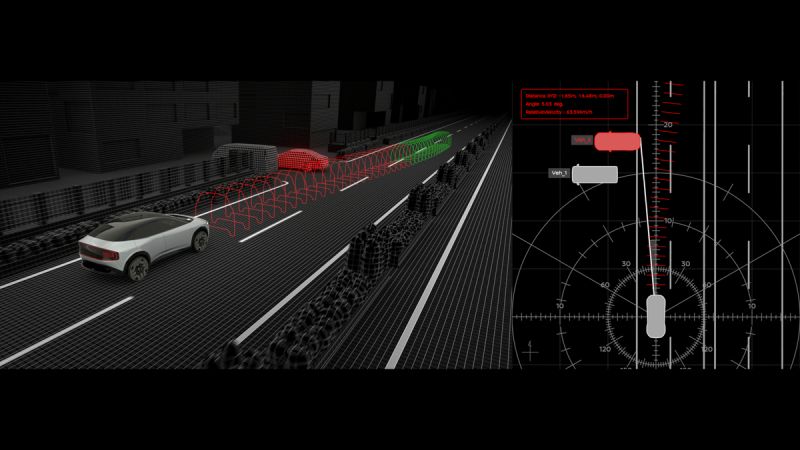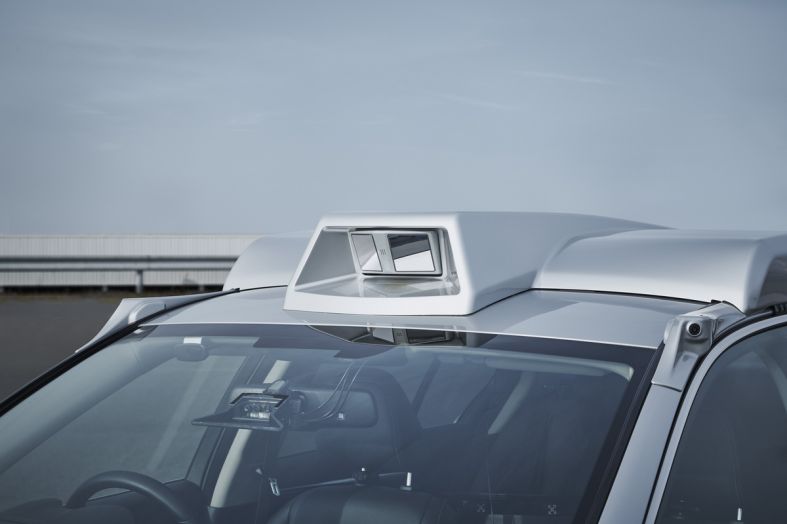Nissan's New Lidar-based Advanced Driver Assist Technology in Development Will Automatically Intervene to Avoid Collisions
【Summary】Japan’s Nissan Motor Co is working on an advanced driver assist system (ADAS) that will significantly reduce the likelihood of a collision, the automaker announced on Monday. Nissan refers to its technology as “ground truth perception”. It works by fusing data from high-performance LIDAR sensors, as well as radar and cameras on the vehicle.

Japan's Nissan Motor Co is working on a advanced driver assist system that will significantly reduce the likelihood of a collision, the automaker announced on Monday.
Nissan refers to the technology as "ground truth perception". It works by fusing data from high-performance LIDAR sensors, as well as radar and cameras on the vehicle. Nissan says the technology can detect the shape and distance of objects, as well as the structure of the area surrounding the vehicle in real-time, all with a high degree of accuracy.
Utilizing this sensor data, Nissan says it's possible for the vehicle to instantly analyze the current driving situation and automatically perform required collision-avoidance operations without driver input.
This technology can also detect slowed traffic and objects in the roadway and will execute automated lane changes accordingly to avoid a collision. The technology can also provide additional support to drivers in areas where detailed map information is not available.
As higher levels of automated driving technology are introduced in the auto industry that can hand over control of the vehicle for periods of time without any driver input, the vehicle's safety systems must be made more accurate and safe, since they will be solely relied on at times.
"Nissan has been the first to market a number of advanced driver assistance technologies," says Takao Asami, senior vice president, leading global research and development. "When we look at the future of autonomous driving, we believe that it is of utmost importance for owners to feel highly confident in the safety of their vehicle. We are confident that our in-development ground truth perception technology will make a significant contribution to owner confidence, reduced traffic accidents and autonomous driving in the future."
Nissan partnered with cutting-edge companies to develop this advanced driver assist technology. The next-generation LIDAR sensor being integrated in Nissan vehicles was developed in collaboration with lidar developer Luminar, a company that's also working with Mercedes-Benz and Volvo Cars to integrate its lidar into the vehicles during production.
Luminar also struck a deal with Zenseact, the self-driving software subsidiary of Volvo Cars, on a full stack, autonomous driving hardware and software system that can be sold to other automakers.
Luminar built its lidar from the chip-level up. The company says its advanced lidar is much better than its rivals, offering higher resolution and detail, as well as a longer range up to 250 meters. Many lidar sensors produced by other companies can only see about half that distance, according to Luminar. This longer range provides more time for a vehicle's safety systems to react.

The long-range lidar sensors from Luminar are mounted on the roof of Nissan's test vehicle.
Nissan is also working with a Silicon Valley startup Applied Intuition Inc., a company that's developing state-of-the-art software simulation tools to speed the commercialization and production of autonomous vehicles. Applied Intuition announced a $175 million Series D financing round in Nov 2021.
The work on advanced collision avoidance technology is part of Nissan's long-term vision, dubbed "Nissan Ambition 2030". As part of that initiative, the automaker is working to develop vehicle control technology aimed to significantly reduce accidents by utilizing next-generation lidar technology.
Lidar works by sending out pulses of laser light that reflect back off solid objects. By measuring the reflected light, a 3D representation of the environment around the vehicle can be created, as well as determining the speed and size of an object. The lidar scans are used to identify other vehicles, pedestrians, buildings and the road itself.
Lidar acts as an extra set of eyes on the road ahead and is widely considered to be a vital technology for autonomous vehicles.
Nissan believes that in the upcoming era of autonomous driving, new types of advanced driver-assistance technology that can avoid accidents will be essential for automakers.
Nissan aims to complete the development of its ground truth perception technology by the mid-2020s. It will first be available on select models, then on virtually every new model sold by Nissan by fiscal year 2030.
-

Two Ford Crown Victorias Still Operating as Taxis in NYC
-

Mazda CEO's Opinion on EV Adoption in the U.S.
-

Hyundai's revolutionary powertrain design
-

Sustainability focus urged by Michelin Fleet Panel
-

BM Catalysts' UK Expansion
-

Warwick University's £12m funding for electric vehicle battery progress
-

Executive X Series: Unveiling the Powerful City/Vios Competitor
-

Hollywood couple defies expectations, showing affection after 20 years
- Michigan-based May Mobility Closes on $111 Million Funding Round, Begins Development on Toyota’s Next-Gen Commercial Autonomous Vehicle Platform
- Nexar Releases its ‘Driver Behavioral Map Data’ That Can Help Autonomous Vehicles Operate More Like Human Drivers
- Toyota is Working With the U.S. Dept of Energy to Advance ‘Megawatt-Scale’ Fuel Cell Powered Stationary Energy Generators
- Good Time to Buy Into China's EV Industry
- China’s CATL to Supply Honda with 123 GWh of Electric Vehicle Batteries by 2030
- Toyota’s New ‘Intelligent Assistant’ Learns Voice Commands and Gets Smarter Over Time Using Machine Learning
- AI-Powered Computer Vision Perception Developer StradVision Closes on $88 Million Series C Funding Round
- Qualcomm Ventures Invests in ThunderX, a Company Developing a Domain Controller-based Intelligent Vehicle Compute Platform
- High Gas Prices Aren’t Enough to Sway Consumers to EVs, Autolist Survey Finds
- Ford Motor Co is Cutting 3,000 Jobs as it Transitions to Electric Vehicles, Software and Digital Services



















 About Us
About Us Contact Us
Contact Us Careers
Careers